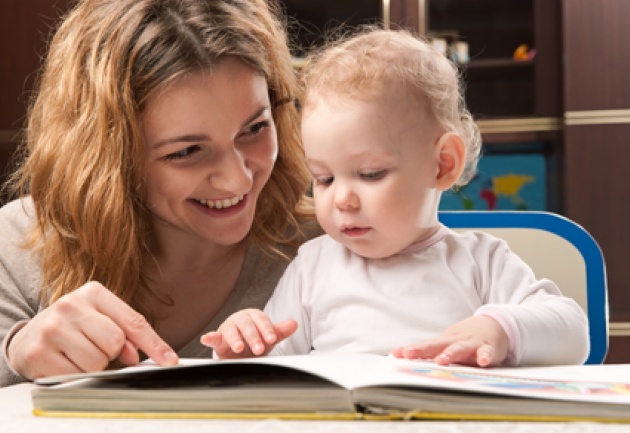As a speech
language pathologist, I know all too well how important it is to read to, and
with your child from an early age. But now, as a first-time mom I actually get
to practice what I have been teaching all these years.
People laughed when I read
to my six-week-old baby. Nonetheless, I could tell she was enjoying it; her
eyes turned to my face and a slight smile appeared on her lips as I read to her.
Did she understand the story? Did she understand the words? No, but basic
listening skills were quickly developing; skills that are of utmost importance
for children who are learning to read. I can't even begin to describe how
delighted I was, when I realized that, after reading Ten Little Fingers and Ten Little Toes for the gazillionth time, my
five-month-old knew when to turn the page by simply “listening” to the story.
Young children
don’t have a very long attention span, which explains why Baby's First Words books don’t have many pages and will seldom
have more than a few words per page. The emphasis will most often lie on colour
and image. The child’s attention for the book is initially caught visually. It
is important however, to add words and phrases to these pictures to help your
child develop language.
A child can only
develop language if he or she is exposed to it. To most parents, it comes very naturally
to interact with their newborns. Parents usually talk in a comforting tone when
the child's crying, they sing to help him go to sleep, or make silly sounds to
elicit that oh-so-adorable smile. A child's language will normally evolve with
age and exposure. Language exposure however, depends significantly on the
child's environment. For instance, a child who is born and raised in the city
of Montreal, will most likely not encounter any farm animals, at least not on a
regular basis; nor will a child raised on a farm in Chicoutimi, encounter a
"Bixi-bike". One advantage of reading to your child at an early age
is that you can enrich his/her vocabulary –vocabulary he/she is unlikely to
encounter in everyday life. At the same time, you expose your child to
different sentence structures and story lines, which is also beneficial for language
development.
Early exposure
to books will help set a foundation for reading success in the future. Make
time to read so you can set an example to your child. Daily book time will turn
reading into a part of your routine and your child as well.
Once a child's
interest and curiosity have been aroused, parents can start building a stronger
reading foundation, well before the child enters kindergarten. I am often asked
by parents if reading a few bedtime stories every night is enough. As a busy
mom and speech language pathologist, I would say it's a good start, but so much
more can be done.
As you noticed
in my introduction, I don’t just talk about reading to your child, but also with
your child. I often tell parents in my school that I’d rather have them peruse
one short book per night, than reading quickly through three books, just for
the sake of filling up that “often dreaded” reading log. In my opinion, it
would be much better to record time
in a reading log, and not necessarily the amount
of books that were read. But what do I mean by, "peruse a book?"
Start by choosing a shorter story, but spending extra time on the content of
the story. This will help your child better understand the story and build
reading comprehension skills. Ask questions like; "Who ate baby bear's
porridge?", "What happened to baby bear's chair?", "What do
you think will happen next?", or "What part of the story did you like
the best?" You could also draw your child's attention to the words in the
story by pointing at them as you read and this will help him/her understand
that the symbols on the page (the letters) have a meaning. By doing this, you
will be helping your child develop important pre-reading skills. It is
important to create opportunities for your child to personally relate to and
connect with the characters in the story. This can be done, by asking questions
like "How do you think baby bear felt when he saw that his chair was
broken?", or "What would you do if someone was sleeping in your
bed?", and "How would you feel if someone ate your breakfast?"
Show your children
that there is vast reading material besides the books on your bookshelf. This
will encourage their interest in reading. Read through an old family recipe
together while baking those delicious holiday cookies. Illustrate to your child
the manual of the bicycle you are trying to put together, and explain that
reading it will help you build the bicycle faster. Direct your child's
attention to words you see in everyday life; words on billboards, words on milk
cartons and cereal boxes.
Another question
I frequently hear from parents is; "What books should I read to my child?" The answer is simple;
Read whatever your child is interested in! If you are the parent of an active
four-year-old boy, chances are that he won't sit for a Cinderella story. But
take out that Bulldozers and Diggers
book, and you will have his undivided attention for the next fifteen minutes.
Each child is different, but it won't take long to figure out what your child's
interests are. In general, girls tend to enjoy stories more than boys, whereas
boys tend to enjoy factual books more. Younger children enjoy nursery rhymes as
they are short and sweet, but did you know that exposing your child to nursery
rhymes on a regular basis was found to be very beneficial for future literacy
skills? What to do however, if you have a toddler and a grade 1 student who
want to be read to at the same time? Young children won't always have the
attention span to listen to a full story, but they might enjoy looking at the
illustrations and being in charge of turning the pages. Older children on the
other hand can be encouraged to "read" to their younger siblings.
Once your child
enters kindergarten and grade 1, the question becomes; "What should my child
read?" Part of the answer remains the same. Read whatever your child is
interested in. However, we now need to find reading material that fits your
child's reading level. Many schools, libraries, and bookstores have a large
variety of levelled readers to suit everybody's needs and interests. Levelled
readers are written specifically to match your child's reading level. It is
important to note, that there are levelled readers which were specifically
developed for children who struggle with reading. These
will allow the child to read at his or her own level but about an
age-appropriate topic. In school, the emphasis will be on your child reading by
himself and less on you reading to your child. Nevertheless, I would like to
emphasize that continuing to read to your child is of great importance for your
child's language and further reading development. Reading should continue to be
a part of your daily routine. Bedtime stories should not be replaced by the
school's reading homework.
A last question
I would like to address is a concern that many parents have; "My child
only wants to read that book, and nothing else!" Children, especially the
younger ones, enjoy and benefit from repetition, whereas for a parent the words
from The Very Hungry Caterpillar start
to sound like a broken record. A child just can’t get enough of that forever hungry
little monster. It is important to expose your child to a variety of books, but
if at bedtime that hungry monster is pulled out of the closet once again,
remember that it doesn't matter what you read, but that you read!!

 In The Latest Issue:Latest Issue:
In The Latest Issue:Latest Issue:
- A Bittersweet Farewell
- The new Laval Aquatic Co...
- The End of an Era:
Articles
Calendar
Virtual- ANNUAL TEACHER APPRECIATION CONTEST
- APPUI LAVAL
- ARTS & CULTURE
- CAMPS
- CAR GUIDE
- CCIL
- CENTENNIAL ACADEMY
- CHARITY FUNDRAISING
- CITYTV
- COSMODÔME
- COMMUNITY CONNECTIONS
- COVER STORY
- DINA DIMITRATOS
- ÉCOLE SUPÉRIEURE DE BALLET DU QUÉBEC
- EDITORIALS
- ÉDUCALOI
- EDUCATION
- EMPLOYMENT & ENTREPRENEURSHIP
- FÊTE DE LA FAMILLE
- FÊTE DU QUARTIER SAINT-BRUNO
- FAMILIES
- FESTIVAL LAVAL LAUGHS
- FÊTE DE QUARTIER VAL-DES-BRISES
- FINANCES
- GLI CUMBARE
- GROUPE RENO-EXPERT
- HEALTH & WELL-BEING
- 30 MINUTE HIT
- ANXIETY
- CHILDREN`S HEALTH & WELLNESS
- CLOSE AID
- DENTAL WELLNESS
- EXTREME EVOLUTION SPORTS CENTRE
- FONDATION CITÉ DE LA SANTÉ
- GENERAL
- HEARING HEALTH
- MESSAGES FROM THE HEALTH AGENCY OF CANADA
- MENTAL HEALTH
- SEXUALITY
- SOCIAL INTEGRATION
- SPECIAL NEEDS
- TEENS
- THE NUTRITION CORNER
- THE NUTRITION CORNER - RECIPES
- VACATION DESTINATION
- WOMEN'S FITNESS
- WOMEN'S HEALTH
- HILTON MONTREAL/LAVAL
- HOME & GARDEN
- INTERNATIONAL WOMEN'S DAY
- JAGUAR LAVAL
- LAVAL À VÉLO
- LAVAL FAMILIES TV SHOW
- LAVAL FAMILIES MAGAZINE CARES
- LAVAL URBAN IN NATURE
- LE PARCOURS DES HÉROS
- LES PETITS GOURMETS DANS MA COUR
- LEON'S FURNITURE
- LEONARDO DA VINCI CENTRE
- LFM PREMIERES
- LIFE BALANCE
- M.P. PROFILE
- MISS EDGAR'S AND MISS CRAMP'S SCHOOL
- MISSING CHILDREN'S NETWORK
- NETFOLIE
- NORTH STAR ACADEMY LAVAL
- OUTFRONT MEDIA
- PASSION SOCCER
- PARC DE LA RIVIÈRE-DES-MILLE-ÎLES
- PÂTISSERIE ST-MARTIN
- PIZZERIA LÌOLÀ
- PLACE BELL
- PORTRAITS OF YOUR MNA'S
- ROCKET DE LAVAL
- SACRED HEART SCHOOL
- SCOTIA BANK
- SHERATON LAVAL HOTEL
- SOCIÉTÉ ALZHEIMER LAVAL
- STATION 55
- STL
- SUBARU DE LAVAL
- TECHNOLOGY
- TEDXLAVAL
- TODAY`S LAURENTIANS AND LANAUDIÈRE
- TODAY`S LAVAL
- WARNER MUSIC
- THIS ISSUE
- MOST RECENT
Magazine
Building a Strong Reading Foundation for Children
Articles ~e 105,7 Rythme FM 4 chemins Annual Teacher Appreciation Contest Appui Laval Arts & Culture Ballet Eddy Toussaint Camps THIS ISSUE MORE...
CONTESTS Enter our contests
CONTESTS Enter our contests
CALENDAR
Events & Activities
COMMUNITY Posts Events
PUBLICATIONS Our Magazine Family Resource Directory
LFM BUSINESS NETWORK Learn more
COUPONS Click to save!
COMMUNITY Posts Events
PUBLICATIONS Our Magazine Family Resource Directory
LFM BUSINESS NETWORK Learn more
COUPONS Click to save!
SUBSCRIPTIONS
Subscribe to the magazine
Un-Subscribe
E-NEWSLETTER Subscribe to our E-newsletter Un-Subscribe
WRITE FOR US Guidelines & Submissions
POLLS Vote today!
E-NEWSLETTER Subscribe to our E-newsletter Un-Subscribe
WRITE FOR US Guidelines & Submissions
POLLS Vote today!
ADVERTISERS
How to & Media guide
Pay your LFM invoice
SUGGESTIONS Reader's Survey Suggest a Listing
LFM About Us Our Mission Giving Back Contact Us
SUGGESTIONS Reader's Survey Suggest a Listing
LFM About Us Our Mission Giving Back Contact Us
 PICK-UP LOCATIONS
Get a copy of LFM!
PICK-UP LOCATIONS
Get a copy of LFM!
TERMS & CONDITIONS Privacy | Terms
ISSN (ONLINE) 2291-1677
ISSN (PRINT) 2291-1677
Website by ZENxDESIGN



 BY:
BY: 
Tweet
Share